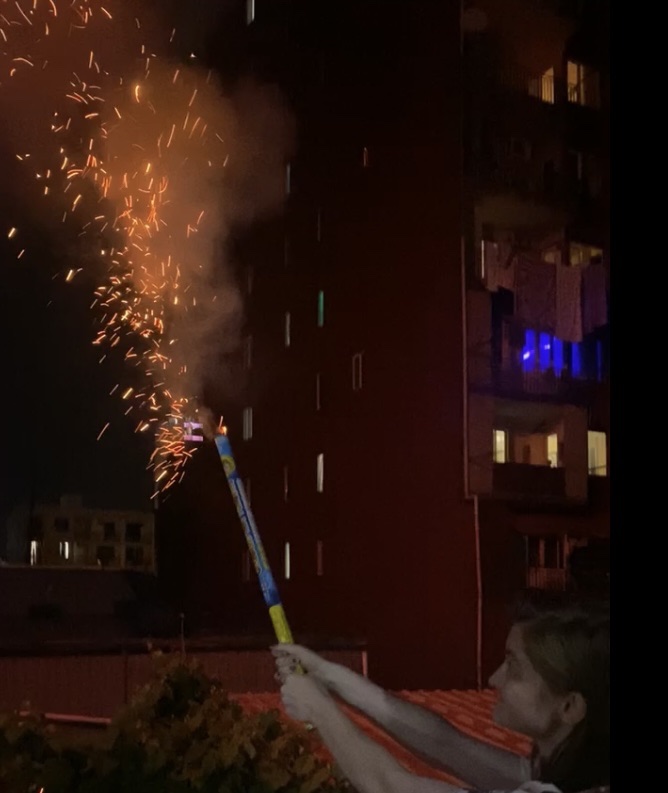I have just landed at O’Hare International Airport and my trip seemed like it went by like a blur. It is already almost August, and in a few weeks I am about to start another semester at Notre Dame. Looking back, I wish I could have stayed longer on the trip (even with the crazy heat wave that hit France after I left). Even with me missing France, I know now I want to study abroad junior year and I am not holding back from this goal. This short two month journey was just an introduction to the next steps in my journey to living in Europe later in my life. I am immensely grateful for Notre Dame providing this opportunity in the summer to experience France and take classes every day to sharpen my language tools. In my last days, I spent a day in the southwest Mediterranean town Sète and enjoyed being on the beach watching the sunset. Here are some photos I took in what I found to be the most laid back city during my stay in France.
Category: Uncategorized
Last Days in Europe
Reflecting on my nearly finished trip to France, I realized how far I have personally grown as well as how far I have progressed in my French usage. I have been able to transition from stumbling on my words to now being able to answer people’s questions and have conversations without putting much thought and effort in what I have to say. I never expected it before the trip, but truly I feel way more natural with the language. I can say for the most part I see the nuances in how native French speakers speak and how foreigners speak the language; for one, it no longer surprises me when French people figure out you are not from France. I understand how their tendencies when speaking and writing differ from, for example, how I use French. However, I have been able to start using the language more and more like how the French normally use it (i.e j’y viendrai dans (instead of en) 5 mins)). I never learned these little tricks while taking classes in the United States, which shows that the best way to fully integrate a language is to travel to a country where it is spoken fluently by everyone born there. Besides talking about my increased cultural awareness from living in France, I will share a few photos of one of my weekend trips to the beautiful city of Barcelona, which was only a couple of hours from Montpellier.
Solidarity with Ukraine in Georgia
I have been waiting to write a blog post about current events only because of the importance of the events in this region of the world right now—I want to reflect my conversations with people in Georgia as accurately as possible in a short post. I did not have to make an effort to gather information about opinions on the war in Ukraine. Many people I encountered were vocal about sharing their condemnation of the actions of the Russian government. I saw countless Ukrainian flags proudly displayed in Batumi. Many Russian speakers wear pro-Ukraine pins to signify their solidarity with Ukraine, café black boards remind customers that 20% of Georgia is occupied by Russia, anti-Russia art and graffiti is visible on almost every block, and among residents of Batumi there is sadness for what is happening in Ukraine and fear for the future.
Conversations with my Georgian host brother, conversation partner, and strangers in restaurants made it clear to me that Georgians value their independence highly. My host family expressed their support for the Ukrainians who have moved to their city, and demonstrations against the war and in support of Ukraine were held throughout the summer. However, even though there is widespread support for Ukraine, Georgia fought a war with Russia just 14 years ago, and even though the Georgians I spoke to strongly oppose the war, their position is also complicated by Georgia’s reliance on Russian tourism, their reliance on access to the Black sea, and their very real fear of Russian invasion.
I could write much more, however, in short, as an outsider, it was beautiful to see Georgian solidarity with Ukraine and I am grateful I had the opportunity to be more aware of and to learn about the war, how it affects Georgians, and public opinion in Georgia.
Bridget
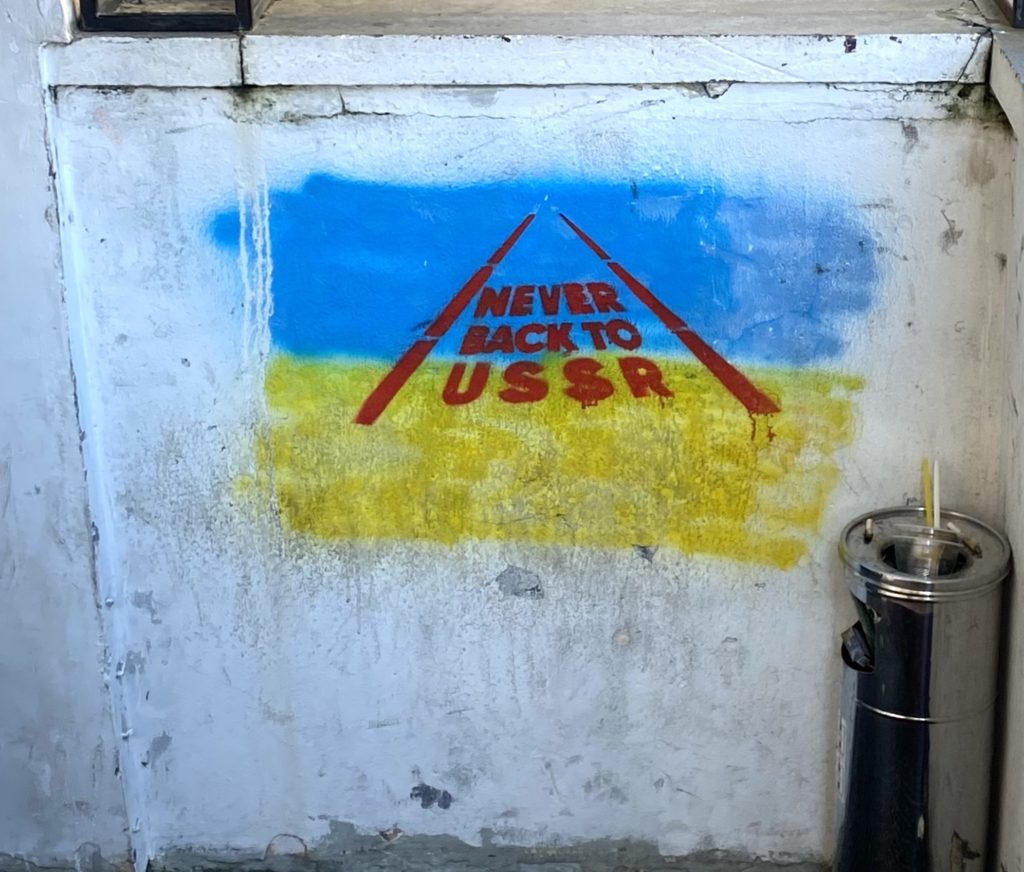
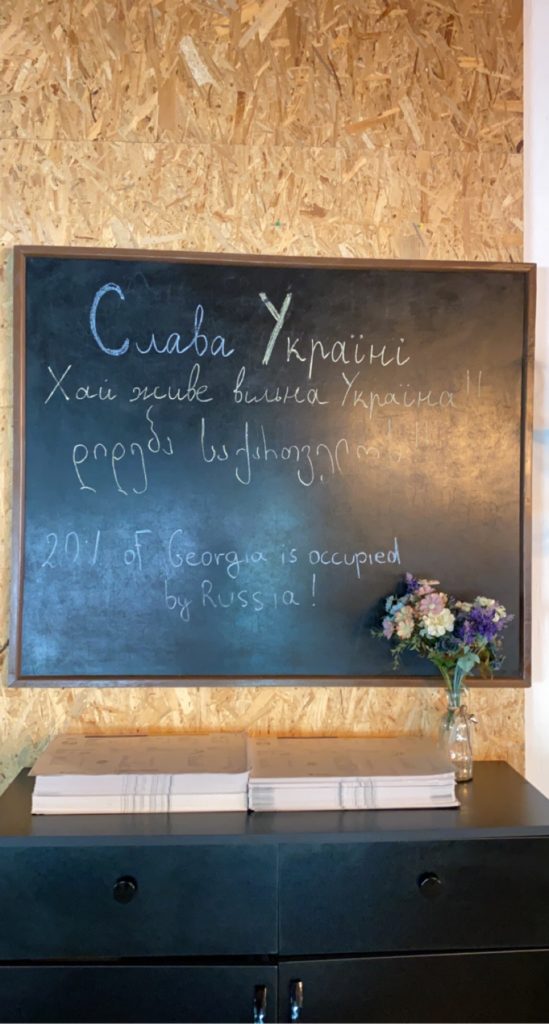
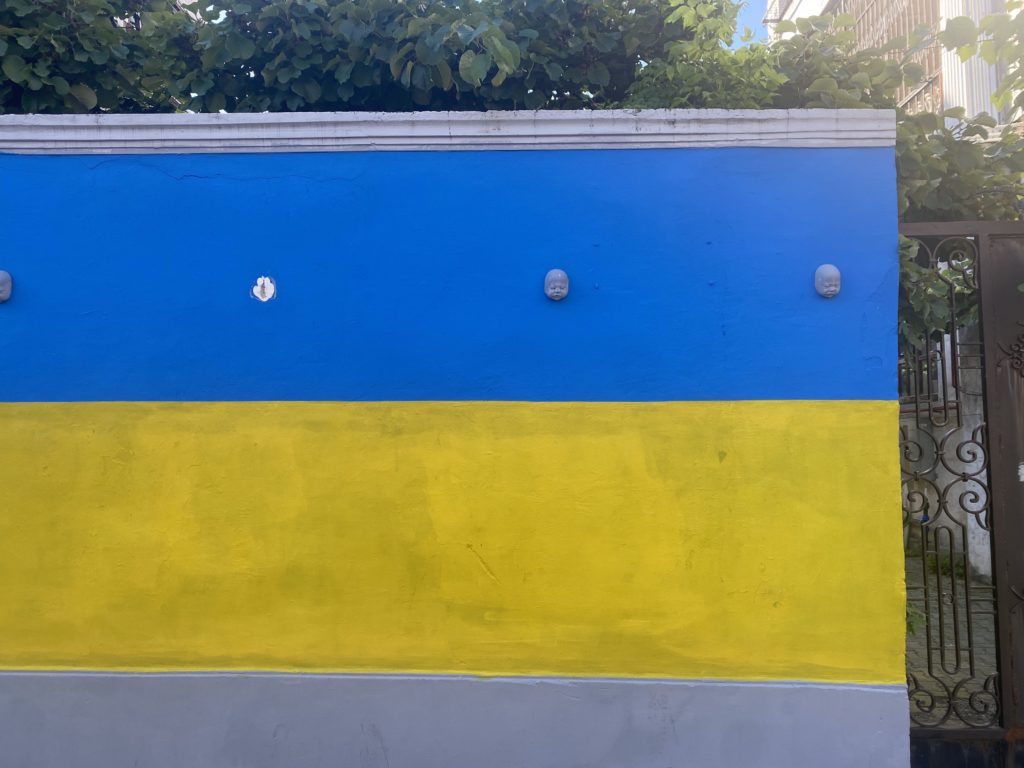
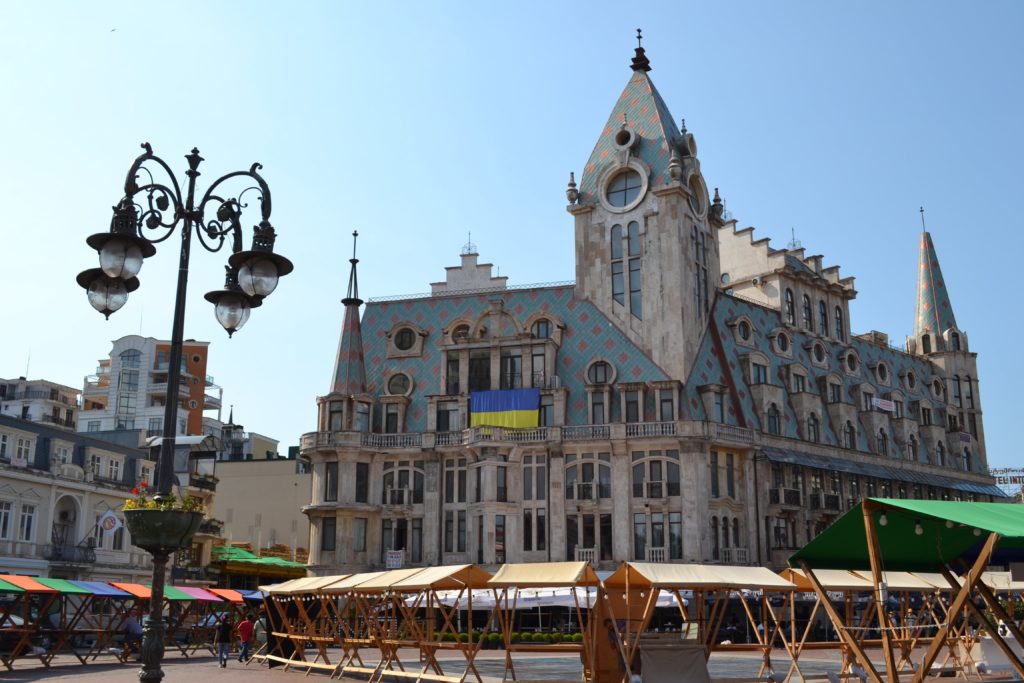
My SLA’s lasting impact
This summer enabled me to meet people and have conversations I would have never thought to have. I went to Timisoara, Romania for a weekend without knowing a soul there. I walked around cities older than anything I had ever seen before.
This summer ignited my already growing interests in City Planning. Seeing how different a city can be and weighing the pros and cons of different layouts was fascinating. I could never have imagined how easy train travel could be between cities thousands of miles apart. I didn’t realize a massive city like Milan could ban personal cars in their downtown areas. I now want to study more and find out how I can give American cities the same feeling of walkability with small local shops, plenty of public transportation, and frequent cultural events. Every household broke their trash into 6 categories for compost, different recycling, and trash. I love composting and having to go back to throwing away my food waste since returning has been very difficult. I am inspired to bring to the US the same sustainable standards that Italy holds itself to and keep trying until the entire country has more livable and sustainable cities.
Being abroad opened my food palate and allowed me to try incredible foods. I had pasta at least once a day which was amazing because I didn’t gain weight. The biggest surprise was going from not liking mozzarella cheese and tomatoes to having them be my favorite food abroad. Everything was so fresh I couldn’t believe it.
These 3 months in Italy included some of the best days of my life. It also included a lot of very lonely days where I felt very far from home and very hopeless. Having such a large language barrier is difficult, because I would want to have the same deep, complex conversations as I do with people in the US, but my vocabulary would limit many of my statements into more obvious, simplistic statements. I had to get used to being seen as a hopeless child in certain situations that followed along without knowing where I was going or what was being discussed. I grew frustrated multiple times with how I was messing up different Italian grammar and was at times very nervous to talk in fear of getting judged.
By the end, my Italian had improved by a lot, as I went from only studying grammar and asking broken questions with my private teacher, to having 2-hour conversations about immigration, transportation, politics, and culture. That last week of class has been one of my proudest moments, and I’m glad I was able to reach that level of Italian proficiency. I look forward to continuing taking Italian classes now after gaining such a great insight into Italian life.
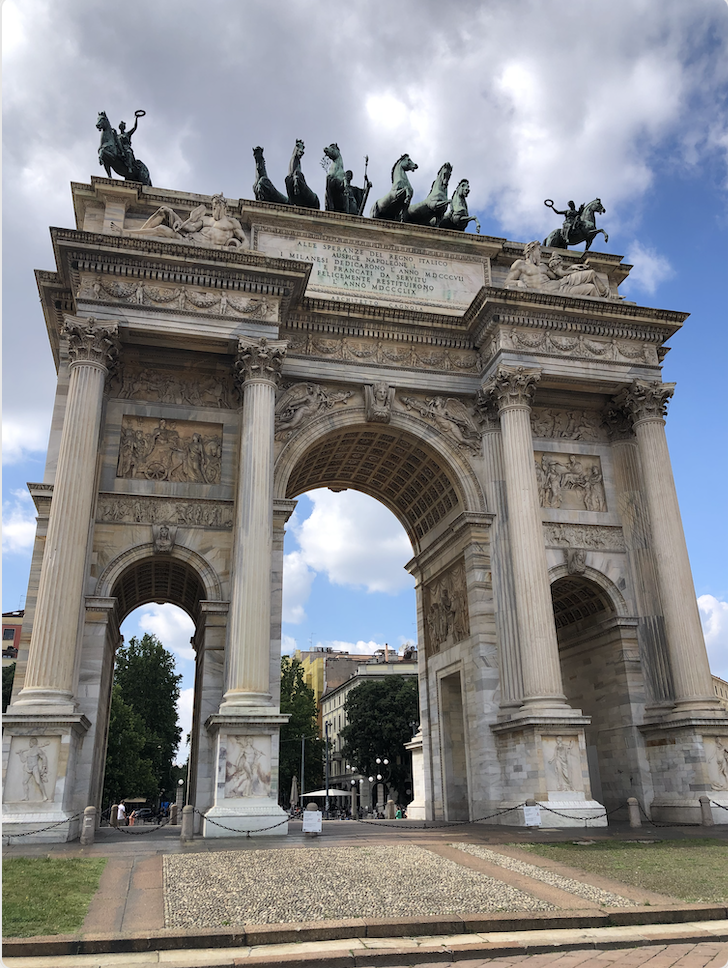

Language in Georgia
გამარჯობა!
While staying in Georgia, I have learned a little bit about language in Georgian culture, such as the fact that most young Georgians prefer to speak Georgian, and also speak very good English. I learned how to say basic words in Georgian, including “thank you” and “hello.” In Russian, one of the most-used terms that I learned very quickly was the shortened version of the Russian word for “now.” In spoken Russian, my professors would use a fast pronunciation that sounded more like “shas.” I also learned about the importance of giving toasts in both Georgian and Russian culture, as well as common phrases used in toasts in each language.
Some of the differences in communication aren’t verbal. For example, Russian speakers don’t usually use eyes in their smiley faces. A Russian speaker will text a smiley face at the end of a sentence like this) and a frowny face like this(. At first, this took some getting used to, but it’s now a habit I have found myself using with my American friends, too. It is easier))
Bridget
Home Again and Reflecting
Throughout my time learning in Ireland this summer, I experienced a few moments of worry wondering if I was really making any progress in learning Irish after I would forget a simple phrase that I used many times before or completely lose my train of thought and slip into an English finish when speaking. However, even after numerous realizations of my progress while away, I have had to think twice almost constantly before greeting and responding to family members upon my return home because my first instinct has been to do so in Irish nearly every time. At least a dozen times per day, I find myself saying “Maidin mhaith!” (“Good morning!”), “Go raibh maith agat” (“Thank you”), “Gabh mo leithscéal” (“Excuse/Pardon me”), and “Slán” (“Goodbye”). Prior to spending four weeks in Ireland this summer, I had never spent continuous time dedicated to learning a language other than English and had only classroom time learning Spanish in high school and Irish in college. Now that I am feeling more inclined to use Irish phrases, I am convinced that conversational comfort and fluency is best developed in an immersive situation in which there are opportunities to use the language with everyone around.
After spending a semester in Ireland during the last academic year, I felt that I had a very good understanding of Irish culture and its similarities and differences from the cultures which I grew up in. Though this was true in many areas of day-to-day life, there were certain values and issues much more clearly present in or exclusive to the Gaeltacht areas (Irish-speaking areas) that greatly revolved around the language and the preservation of culture. The Gaeltacht areas in which the vast majority of the population use Irish in daily conversation are quite small when compared to the rest of Ireland where people generally use English in conversational situations. When our course included field trips outside of the Gaeltacht areas, we very rarely heard spoken Irish and written Irish was also less prevalent, but still present since it is recognized as an official language in the country. Therefore, if those of us learning wished to order food in a restaurant in Irish or use the language in a shop or any other business, we could only do so within the Gaeltacht. I grew up in a very rural area myself and was impressed by the relatively robust business parks, various shops, and multiple restaurants in the Gaeltacht areas in both Donegal and Galway but compared to the options and opportunities available in the larger towns nearby, choices were limited. In addition to these situations, educational and employment opportunities in the larger cities within Ireland tend to attract young people more so than those in rural areas, a familiar phenomenon in the United States, too. For a long time, this has created a tension between the desire to pursue higher education or different employment opportunities, presently requiring the use of English to do so, and the desire to preserve the language and the unique culture within the Gaeltacht communities as fully as possible, at times necessitating sacrifices. Clearly, my experience this summer provided me with a great deal of insight beyond the language learning process itself and sparked a greater interest in the social dynamics surrounding Irish and the communities that choose to maintain its legacy.
Though my time in this immersion course was relatively short compared to some programs that other SLA recipients participated in, I can confidently say that I was learning something new every day and at nearly every moment. With time for constant observation and participation in class, on field trips, in homestays, and while interacting with locals in town, I gained a much greater understanding of the Irish language’s life within the Gaeltacht areas and its native speakers. During my time in Ireland, I sometimes found myself feeling overwhelmed and convinced that it would be impossible for me to process so much information, tempting me to block anything new out after a certain point in the day. However, though I am still digesting many experiences and will continue to do so for the next several weeks, I am thankful that I allowed myself to soak up more than I thought possible so that I can continue to learn and make more concrete connections by looking back at home. I also saw that extended language studies are extremely beneficial for all individuals, no matter the level of fluency. Although I had a solid classroom basis to grow from this summer, I observed beginner students with no class experience and intermediate students that were self-taught or had fewer classes develop in an unbelievable way. Now that I have returned, my task is persistence in the classroom and any time I get the chance to practice, which will further solidify this summer’s headway.
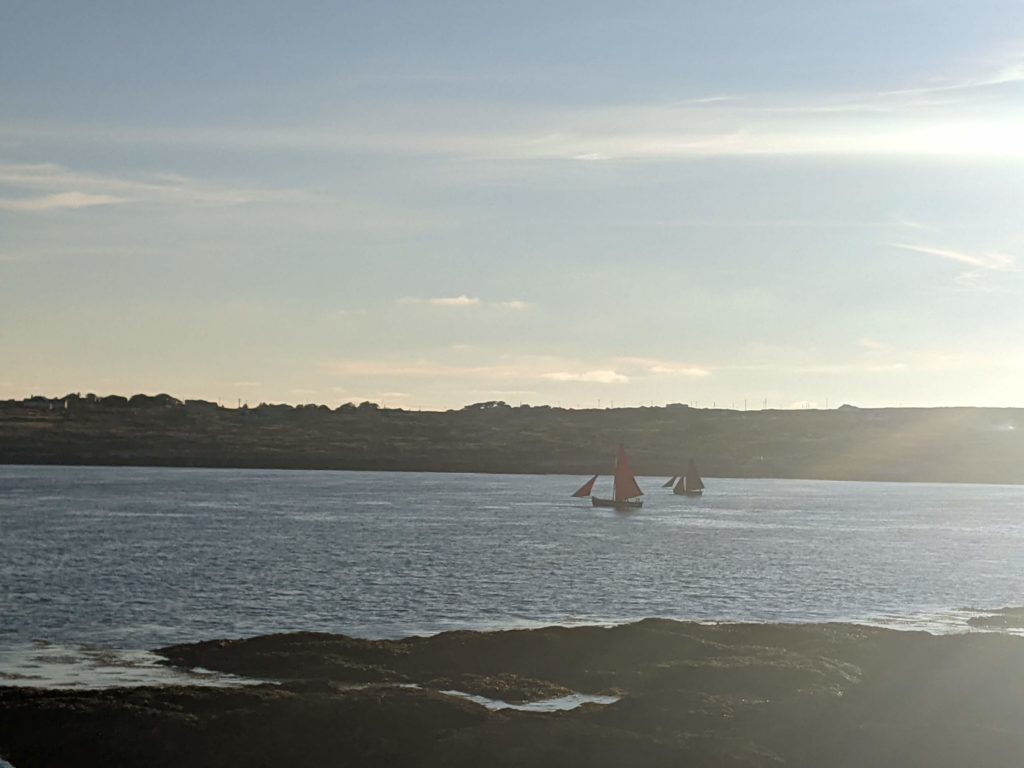
Reflecting on France
When my mom and my sister picked me up from the airport, I was immediately met with the smell of In-n-Out – I knew I was home. After enjoying some of In-n-Out’s classic “animal fries,” I was still processing that I was no longer in France. The past few days at home have been a lot of me correcting my “bonjour” and “merci” to “hello” and “thank you” (which I am still in the process of adjusting to) and reflecting on the incredible summer of learning French. Looking back into my first expectations of the summer, I am really delighted to see that I have strengthened my confidence in speaking French and have gained so many new perspectives on lifestyles, humanitarian assistance, policy issues, or the time that is best to eat dinner.
In terms of the language acquisition process, I have had the privilege of having incredible teachers who have really underscored for me how important dialogue and constant conversation in French is. Before this summer, I had certainly been much more calculated in how I would speak when I would try to speak in French, however that is not how language works – it is truly more of a flow of words and the grammar and vocabulary are best learned when *attempting* to speak fluidly and not let my fear of making mistakes while speaking French inhibit my flow of conversation. In addition, through this language acquisition process, I believe that I have strengthened my ability to ask people for help while struggling to come up with a certain vocabulary word, or get validation for the correct pronunciation or grammatical structure.
Having the opportunity with the SLA grant to live in France for two months has opened so many doors for me and has really helped me grow into a person who is less fearful of asking for help and is eager to meet people from all over the world. With meeting new people, I have particularly seen the power of language bringing people together and forming a closer connection. In the hostel and in my French school, I would witness my friends where English is not their first language immediately light up when they met someone who shared the same native language. Seeing this connection has further strengthened my desire to continue learning French, and hopefully expand my language acquisition to new languages! I cannot thank the SLA grant and donors enough for providing me with this experience to practice French and immerse myself in French culture!
Last Day at Middlebury – Reflections
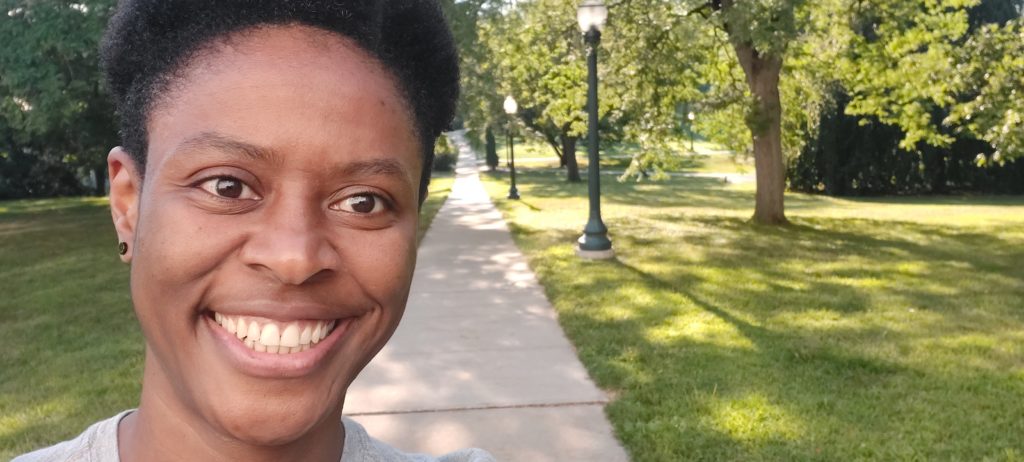
My time at Middlebury College was a truly unforgettable experience. I gained very important insights about the process of language acquisition. During the program, every weekday we took four hours of classes in the morning. During the classes we would learn new grammar and vocabulary, then immediately put it to use by speaking with the person sitting next to us. Quite simply, the best way to learn a language is to use it! It’s a skill like any other. You have to speak, write and think in Japanese as often as possible.
Moreover, after class ended, we weren’t exactly “free”. There was homework that was always due the next day and daily online quizzes. This was important not only for reinforcing the fundamentals, but speaking and hearing the language is always the best way to learn. Therefore, during lunchtime and dinnertime, all Japanese students and professors ate in the same cafeteria space. This encouraged conversation. Learning a language is an incredibly humbling experience because as a graduate student I pride myself on my ability to speak and write well. However, when I was communicating in Japanese sometimes my diction was little better than a toddler’s and it was at times quite frustrating when I couldn’t think of the right word in the middle of a conversation. It was in those moments that I learned another important lesson: language-learning is communal. When I did not know the word or grammatical rule, I would ask my classmate and they would do the same in return. We helped each other grow. Being willing to ask for, receive and give help is essential to making the language learning journey easier.
I believe that the above is some of the best advice that I can give to someone who was considering applying for an SLA Grant or preparing to start their own summer language study. Be humble and prepared to make mistakes (constantly). But don’t lose faith. You’ll get better every day even if it doesn’t feel that way right away. That’s why I would say that the thing that has changed most about me since completing Middlebury’s immersion program has been learning to not let my desire for perfection interfere with my desire to get better.
“The American”
In Georgia, I was often referred to as the American student.
The responses I got during my time in Georgia about the United States and about my being American were really positive. As I do not look Georgian or speak Georgian, I was asked many times where I was from and why I was in Batumi. A lot of people thought that it was really cool that I was from America and that I was visiting Georgia, and they said not many Americans go to Georgia or Batumi, and that I was the first American they had met. People of all different ages and genders were really kind and interested in where I was from. When I had my nails done by my host mom’s friend, Tiniko, who is 44 and speaks Russian but not English, I asked her what she thought of the United States and if she had ever been here. She said she had not ever been to the U.S., but that she would love to go one day. I asked her what she thought most Georgians felt about the U.S., and she said many Georgians view the U.S. as a place with good jobs, good pay, and better education. In another interesting conversation I had with a 38-year-old man named Paata and his friend, they said that Batumi, which is seen as a resort town, is good to visit for tourists, especially from the U.S. where there is a great exchange rate for the dollar, but that it is not so cheap to live there as a Georgian. This was a little eye-opening for me, because I figured that average Georgians made similar wages to average Americans, in the sense that they made more Lari in quantity, but the exchange rate in spending would be similar if they were to come to the U.S.

In general, younger people seemed to also have a positive attitude towards the United States, and while I was waiting for Tiniko to do my nails in her boutique, which also sold clothing, her daughter brought me a pair of black jeans that said “Led Zeppelin” on the tag, and she asked me what that meant. I told her it was a band, like with musicians, and she got a kick out of that! My host brother, Saba, wants to be a captain on a ship and travel the world, and as he learned the English language throughout his time at school, he said English is a very important part of the job he wants to pursue. As far as furthering his education, he asked me about Notre Dame and where it was, and said he thought he had actually heard of it before, and that if he could, he wouldn’t mind going to a university in the U.S.

As well, just looking through a couple clothing stores and simply walking around the town I got a feeling that the attitude towards Americans was relatively friendly. I saw American musicians and celebrities on t-shirts, I saw multiple people wearing t-shirts with the American flag and other emblems of the United States; one man was even wearing a t-shirt with “USMC” written on it. And not to forget, Batumi is home to the coolest McDonald’s in the world.

A Georgian Fourth of July
გამარჯობა!
Hello!
This week my host family held a Fourth of July celebration for me and the two other American students in my homestay. It was a wonderful evening, for which my host family made us a delicious dinner of Georgian barbecue, Georgian salad, khachapuri, watermelon, and ice cream, lit fireworks, and talked to us about our country.
According to Shota, who is 17 and has visited New York City and West Virginia in the past, America is somewhere many young Georgians dream of going. They have been exposed to American culture through social media, like TikTok, and through American TV shows. My host siblings asked us questions about the representations of American high school they’ve seen in shows on Netflix, Hulu, and HBO, such as, “Are cheerleaders real?” Shota told us that he sees America as a place of excitement and great economic opportunity, and that some of his friends believed it would be easy to become famous if only they lived in America.
Our host parents talked about how important they believe America’s place is in world politics. Our host father gave a toast to our country, saying that “America doesn’t just take care of its citizens, it takes care of the world.”
While Georgians are generally extremely welcoming to visitors and very friendly towards the U.S., not everyone was so positive. For example, one older woman expressed concern about the toxicity of American food, and while some young Russians living in Batumi told us they would love to move to the U.S. if they could, others told us they think the American dream is slightly overrated, and they prefer the European lifestyle to the “busy,” “overworked,” and “materialistic” American one.
Until next week,
Bridget
